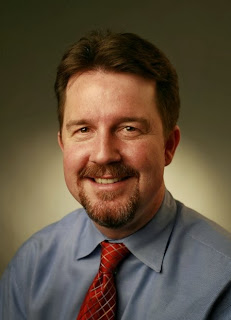Here's my recap of the event.
 |
| Todd Stone, Star Tribune Business News Editor |
Todd Stone (TS): "Social media has changed everything in a lot of ways." Stone added that the Star Tribune can reach more people through social media, and that "readers can engage us in so many more ways than before."
Kaeti Hinck (KH): "Social media gives reporters access to a wider array of contacts and tips." Hinck pointed out that MinnPost staff members check social media throughout the day.
Dirk DeYoung (DD): He starts his day at home editing the "Morning Roundup" e-mail. "We don't save things for the print edition any more. The print edition is now for a deeper perspective." The Business Journal staffers use Twitter to get news tips; DeYoung highlighted how his reporters used LinkedIn recently to confirm that archivists were laid off at Target Corporation.
David Fondler (DF): "The Internet has made our jobs more challenging -- the challenge is figuring out what is news." Fondler pointed out that Twitter is an excellent tool to help with reporting.
2. How do you like to be pitched by public relations professionals?
DF: "It's become much more of a fire hose -- everyone thinks that their executive should be
 |
| Kaeti Hinck, MinnPost Director of News Technology |
DD: DeYoung said that he looks at least at the subject line of each e-mail, and that social media doesn't always get to him -- so e-mail and phone can work better.
KH: "Social media provides the opportunity to learn about reporters and target pitches." She added, "If a company is doing good work, we're going to notice."
TS: He said that he likes to be contacted by e-mail or by phone call. "Use social media to get information out there, but contact reporters in the traditional ways."
3. What types of pressure are you getting to drive traffic to websites?
TS: "We want to engage more and more people."
 |
| Dirk DeYoung, Minneapolis/St. Paul Business Journal |
KH: "Traffic remains important to us, although we're going after the right audience -- not just any audience." Hinck added that she considers page views a dying metric.
DD: DeYoung said that The Business Journal constantly has goals to meet regarding growing page views and e-mail subscribers. He said that the publication's afternoon e-mail update has 16,000 subscribers. DeYoung said that the demand for videos is very strong, and that The Business Journal either shoots its own videos or uses videos from other sources.
DF: Fondler hasn't really felt pressure to drive traffic or get more page views. His team is constantly trying to keep headlines updated on the St. Paul Pioneer Press website. "Our mission is to get news to as many people as possible."
4. Do you see opportunities for media alliances?
DF: "I think it's a great idea."
DD: DeYoung mentioned that some other markets within The Business Journals chain have partnered with TV stations; the Minneapolis/St. Paul Business Journal has partnered with KMSP-TV and WCCO Radio. In addition, The Business Journals chain has a national partnership with Bloomberg.
KH: She said that MinnPost has a lot of partnerships.
TS: "Part of our mission and business model is to create unique content." He added, "Digital isn't pressuring us to partner with other organizations."
 |
| David Fondler, St. Paul Pioneer Press Business News Editor |
TS: Stone said to keep Twitter feeds more professional than personal. "Be specific. Be precise." He added, "We use Twitter a lot as a reporting tool. Facebook provides us an opportunity to engage in the conversation."
KH: "Be smart -- don't feed the trolls." Hinck also said to acknowledge any mistakes quickly, and to think before you retweet. "Choose one or two networks to focus on. Define your goals and measure those goals."
DD: "Don't be boring." DeYoung highlighted General Mills and Target as two brands that have excellent social media promoting blog content. DeYoung also recommended monitoring all streams of social media mentioning your company. He encouraged companies to make the Twitter handle easy to find on the website home page and in press releases.
DF: "Recognize that companies can't control the messages in social media." In regard to negative stories, he said, "Don't lie. Provide us with access. We'll make every opportunity to be fair." Some aspects of news criteria that Fondler mentioned were: Is it new? Is it unique? Does it touch a lot of people's lives? Is it local?
The panelists also mentioned that they still use wire services, such as Business Wire or PR Newswire.
No comments:
Post a Comment